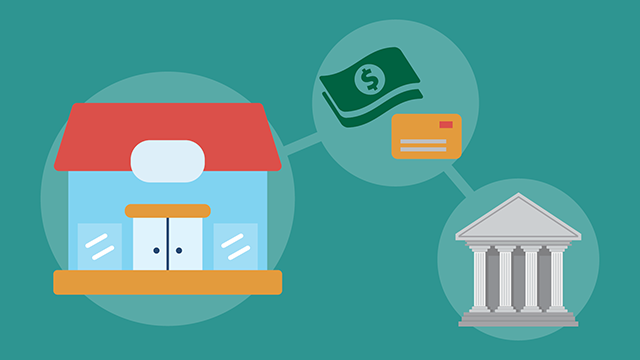Leading Tips for Navigating Pre Approval Student Loans with Confidence
Leading Tips for Navigating Pre Approval Student Loans with Confidence
Blog Article
The Duty of Credit Score Scores in Getting Local Business Loans for Business Owners
In the competitive landscape of entrepreneurship, securing a little business financing commonly pivots on the critical factor of credit history scores. A greater credit scores rating can open doors to favorable financing conditions, while a reduced score might present substantial barriers.
Comprehending Credit History
Credit score scores are vital numerical representations of a person's creditworthiness, working as a crucial element in economic decision-making for lenders. These scores are stemmed from a thorough analysis of a person's credit rating, including facets such as payment history, credit report use, size of credit scores background, brand-new charge account, and sorts of credit used. Normally varying from 300 to 850, greater ratings symbolize reduced threat to lending institutions, while reduced ratings show greater threat.
The calculation of credit history is executed by credit report bureaus making use of exclusive formulas, with one of the most commonly acknowledged designs being FICO and VantageScore. Each design may weigh elements slightly differently, but they all purpose to give a consistent procedure of debt threat. A solid credit rating shows the individual's integrity in taking care of financial obligation, making timely payments, and keeping a healthy and balanced balance in between credit made use of and offered credit report.
It is very important for people and local business owner to understand their credit score scores, as these numbers can have far-reaching ramifications past personal financing. Routinely checking one's credit history record, fixing errors, and adopting sound monetary behaviors can considerably improve credit rating ratings, thereby enhancing the individual's general financial account and credit reliability.
Importance for Financing Approval
Understanding one's credit history is fundamental, as it plays a substantial function in the process of lending approval for small companies. Lenders use credit report as a primary statistics to examine the credit reliability of applicants. A strong credit report indicates a history of liable financial behavior, recommending to lenders that the candidate is most likely to pay off the lending in a timely manner. Consequently, a high credit scores score can considerably boost an entrepreneur's possibilities of protecting a finance with positive terms, consisting of lower rate of interest rates and even more adaptable settlement choices.
In contrast, a reduced credit report score might signify prospective threat, leading loan providers to either turn down the car loan application or enforce stricter problems. This makes it critical for entrepreneurs to be mindful of their debt standing, as it straight affects their capacity to access funding. Credit score scores serve as a standard step that makes it possible for lenders to enhance their decision-making procedure, making sure performance and consistency. As local business typically call for prompt accessibility to funds for growth and sustainability, keeping a durable credit report comes to be vital. Therefore, understanding and taking care of one's credit report is a crucial component of preparing for financing applications and accomplishing business success.
Elements Impacting Ratings
Numerous factors add to the resolution of a credit history, each playing a critical role in shaping an individual's credit scores profile. Amongst these, payment background sticks out as the most influential, reflecting the timeliness and uniformity of financial obligation repayments. Lenders closely scrutinize this facet to evaluate financial integrity. The amounts owed, or credit application, dramatically effect ratings. A high ratio of made use of credit rating to readily available credit report can suggest economic overextension, adversely affecting credit reliability.
Size of credit rating additionally factors into debt score computations, with a much longer credit report generally seen much more favorably. This metric supplies understanding right into the person's long-lasting economic actions, supplying lending institutions a broader perspective on their credit history monitoring abilities. In addition, the sorts of credit in use are considered, as a mix of charge account, such as revolving credit report cards and installment financings, can show the capacity to handle different financial obligations.
Last but not least, current debt questions might influence scores (pre approval student loans). Constant applications for brand-new credit report can suggest economic distress, therefore adversely influencing ball game. Each of these elements is vital in the extensive assessment of a credit rating, influencing a business owner's ability to safeguard a bank loan
Improving Your Credit History
Boosting one's credit scores score is similar to nurturing a garden; cautious interest to essential areas can produce considerable enhancements. Repayment history constitutes a substantial portion of a debt score; thus, establishing up automated suggestions or settlements can aid preserve consistency. High credit history use ratios, or the amount of credit scores used relative to the credit rating limit, can adversely affect scores.

Lastly, maintaining older credit scores accounts can positively affect the ordinary age of credit rating, which is another factor in racking up designs. While new credit history inquiries should be decreased to prevent short-term score dips, liable debt administration in time will normally cause score renovation, therefore enhancing qualification for positive bank loan terms.
Alternate Funding Choices
Navigating the globe of small organization funding typically requires checking out alternate choices beyond typical financial institution car loans. Entrepreneurs with less-than-ideal credit history might locate these options not just much more accessible however additionally tailored to their one-of-a-kind company demands. Among the most preferred options are on the internet lending institutions, which have multiplied recently. These platforms normally offer quicker authorization procedures and more versatile terms than traditional financial institutions, frequently taking into consideration factors beyond credit history, such as company performance and capital.
Furthermore, microloans, typically provided by nonprofit organizations, provide to tiny companies and startups. They provide smaller lending amounts with reduced rate of interest rates, making them perfect for business owners who require restricted capital.
Billing financing and vendor cash loan are also worth taking into consideration. The former involves selling impressive invoices to a loan provider at a discount, while the last gives an advance on future sales. Both choices can improve capital without the rigorous debt demands of typical financings.
Conclusion

These scores are acquired from an extensive evaluation of a person's credit score history, including facets such as repayment background, credit report utilization, length of credit history, brand-new credit history accounts, and types of credit score made use of (pre approval student loans). A strong credit scores rating reflects the individual's dependability in taking care of debt, making prompt settlements, and keeping a healthy equilibrium between credit score used and offered credit score

Report this page